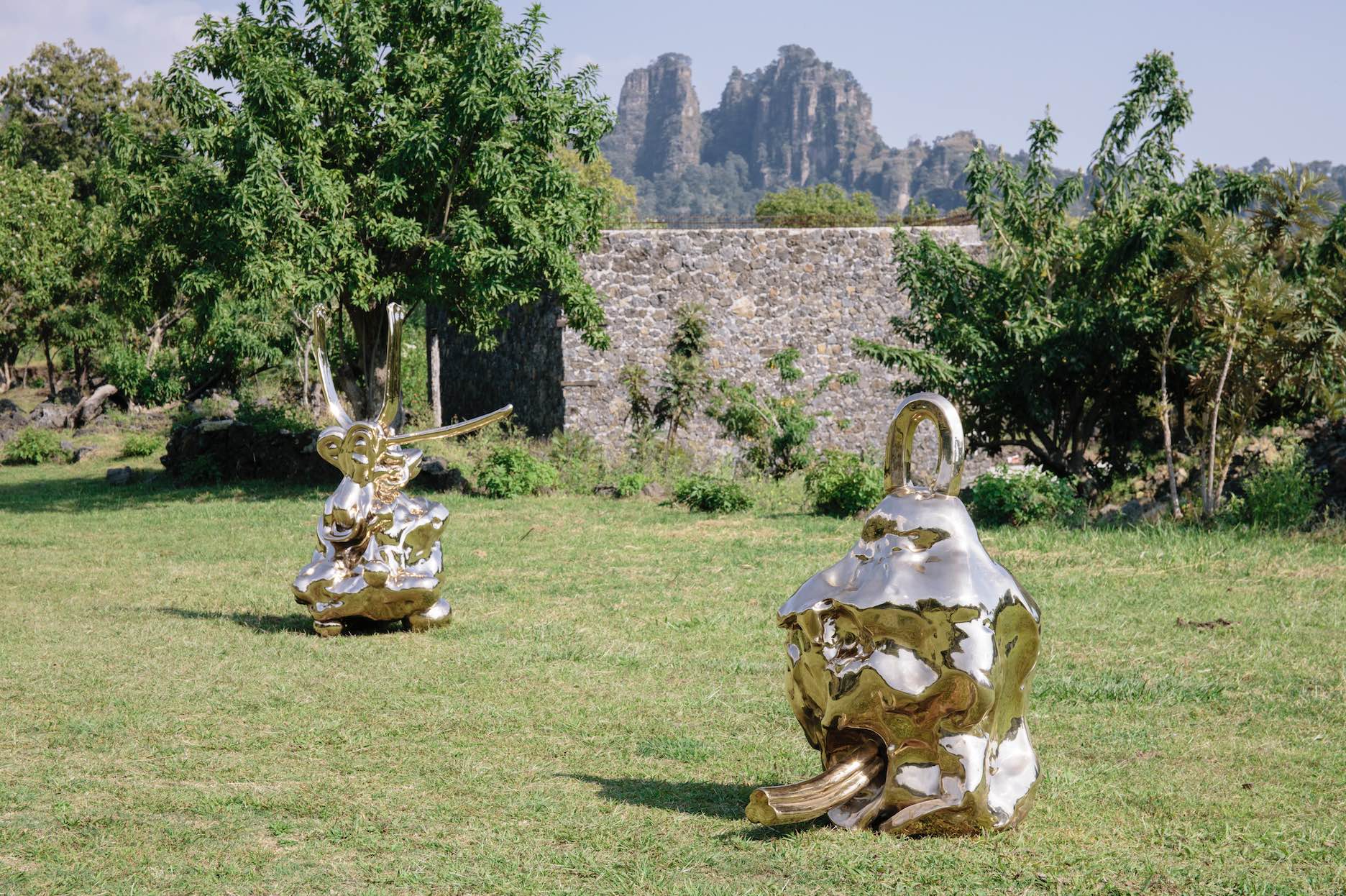
Alma Allen
Nunca Solo
Exhibition
-> Feb 10 2023 – May 28 2023
The Anahuacalli Museum presents Nunca Solo (Never Alone), a solo exhibition by sculptor Alma Allen.
Nunca Solo as a spiritual and sculptural retrospective of Alma Allen's visual and cultural identity presented by Museo Anahuacalli.
Rather than a retrospective of existing works, the Tepoztlán, México-based artist has elected to create an entirely new series of large-scale bronze sculptures for the museum and grounds. Nunca Solo, curated by Karla Niño de Rivera, embodies a conversation with this monumental testament to Diego Rivera’s vision: his design for Museo Anahuacalli’s pyramid-like architectural structure, the museum’s collection of pre-Columbian art objects and the area’s volcanic landscape and quality of light.
With a distinct visual language orchestrating immediate mark-making and meticulous carving and casting, the works of American-born sculptor Alma Allen (b. 1970) are inseparable from a sense of movement and the moment of their approbation, emitting a mysterious and ineffable lifeforce. Yet in their willing engagement with an expansive range of allegorical and organic references, the works link abstraction and Allen’s authorial gesture to the ambiguities of poetics, narrative and mythology, allowing a visceral charge to emerge from the timeless qualities of sculpture and material.
“Alma is engaging with the museum as what it is: a temple, a model of the universe, as a cosmogram,” said Karla Niño de Rivera, curator of Museo Anahuacalli. “Everything is political, especially in the shadow of Diego Rivera, but Alma approached the space, even before we met, with a personal sense of inquiry. Alma was in the temple like a hermit in a cave, and the emotional intensity of the works is a spiritual engagement that reflects the experience of a non-linear transformation.”
The artist Diego Rivera (1886–1957) began construction on Museo Anahuacalli in 1941 to house his collection of pre- Columbian art and artifacts and to emphasize the continuity of ancient forms and techniques in the modern art of the period. For its location, Rivera chose the rocky terrain of the Coyoacán region in Mexico City that once surrounded the Xitle volcano. Rivera imagined Anahuacalli as a unique work of art in itself, and it would prove to be his last piece.
Guided by curator Niño de Rivera, Allen’s research into the conception of Museo Anahuacalli, which was completed by architect Juan O’Gorman after Rivera’s death, and his affinity for the museum’s exceptional representation of art objects from Colima, stimulated a new series of work exploring the parallels between the artist’s intimate notation and that of the museum’s collection, of which 2,000 pieces selected by the Mexican poet Carlos Pellicer are on permanent display.
Among the sculptures created by Allen for Museo Anahuacalli, and shown in Nunca Solo for the first time alongside the permanent collection, is a teeming bronze mass like a lava flow anchoring what appears as a fragile, sinuous stalk, spiraling upward and reflecting its surroundings. Another work —installed in the vast plaza in front of the museum, its volume specifically mirroring that of the stone removed from the land for the building— offers a poked and torn form riddled with coded marks and slugs, pulled in upon itself, from which emerges a round sign, like the eye of an envoy peering out. In these works, Allen continues to situate his mercurial yet instantly recognizable visual vocabulary and inner visions within the layered span of history, returning not what is remote from the past but that which is achingly and ever-precariously present, not flattened antecedent but energetic correlation.
I am interested in the spiritual work of sculptors, communicating without language. I mean in the effort to communicate, sometimes across time or understanding, with something that is incapable of returning the speech. Alma Allen said.
Relocating from Joshua Tree to Tepoztlán, México, in 2017, Allen is known for sourcing and foraging the material for his sculpture from the natural environment surrounding his studio, and for an exceptional level of control and exactitude in creating his works within his own studio and foundry. At Museo Anahuacalli, the new sculptures culminate an increase in recent years in both formal and material complexity, and signal an exploration of fragmentation and permutation. These works, all “Not Yet Titled”, seem to reach simultaneously into the past and future, including interrogating and mutating the artist’s own compulsive motifs. In their eccentric outcroppings and existential volatility, rendered with an impeccable softness and fluidity, Allen’s works are talismanic not only in their atmospheric qualities but also by way of their playfulness, simultaneously inviting the viewer in on a joke or possibility, and resisting legibility.
Nunca Solo will remain on view at Museo Anahuacalli through May 28, 2023, and will engage both the museum grounds and interiors, including the iconic stone building, designed by Rivera and O’Gorman; the ecological preserve surrounding the museum, the only one of its kind in México, and the new museum expansion completed in 2021 by Mexican architect Mauricio Rocha. The exhibition is supported by a stipulation in Rivera’s will that Museo Anahuacalli present contemporary work alongside the collection of 59,400 Mesoamerican art and objects that Rivera bequeathed to México.
— Museo Anahuacalli